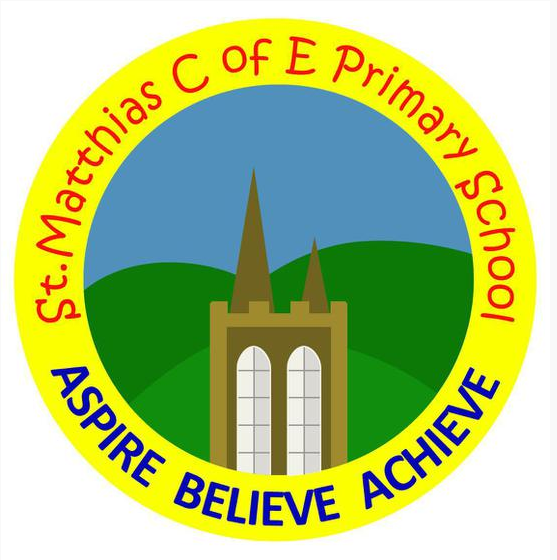Nursery and Reception
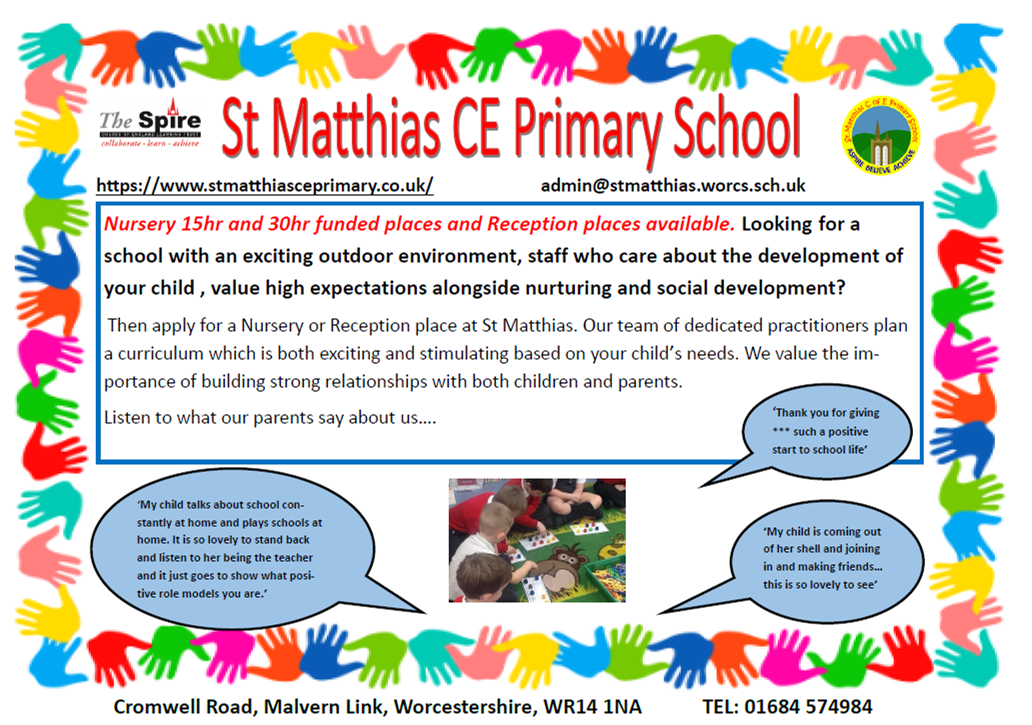
Welcome to our Early Years!
At St Matthias we aim to provide a safe, happy and enabling environment for learning where caring staff work alongside parents in supporting each child to reach their full potential. We believe that children learn through play and practical exploration and we aim to provide exciting learning opportunities tailored to match the particular interests and needs of the children within the group. We aim to promote effective communication skills, positive relationships and the confidence to think creatively.
We value each child as a unique individual with their own particular collection of abilities, learning styles and interests and we hope that each child will enjoy their time in our Early Years setting and leave feeling assured of their own self-worth and with enthusiasm for learning.
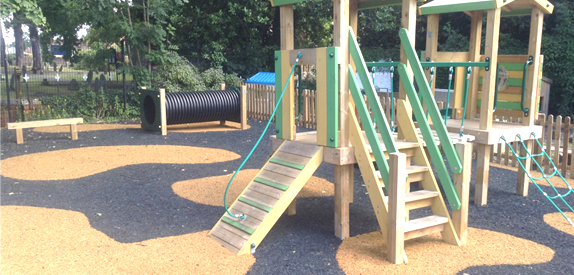
Our Early Years
We are fortunate to have a large, light and spacious Early Years unit, complete with kitchen and toilet facilities and a safely enclosed outdoor learning area complete with a garden and all weather shelter. In addition, the children regularly make use of other school facilities, such as the hall for movement work, the field and the computer suite.
Parents and Early Years Staff as Partners
Young children are constantly learning, through their experiences, their relationships and their opportunities for play, so learning of early skills takes place both at home and in school. Parents can share with us information about their child such as any health needs, any areas of concern, particular strengths and favourite activities.
Early Years staff are normally available at the beginning or end of every session and appointments can always be made for longer conversations.
Parent consultation meetings are also held twice during the year for children in the Reception class, to discuss each child’s development.
During the year there are various events organised when parents are especially welcome to play alongside their child in the Early Years setting or to join the group for story times or outings.
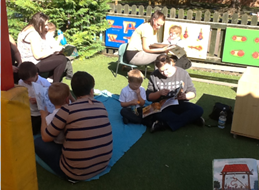
Communication
We currently use Class Dojo which allows you to see the learning that your child is doing at school on your computer, phone or tablet. It also allows you to send photos to us of all the amazing things that you are doing at home.
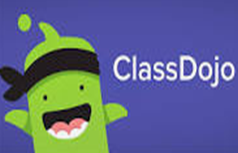
Settling In
We recognise that some children will be happy to come straight into school and learn and play independently. However, we realise that starting school may be a new experience for some children and that initially, they may find it difficult. Separating from family can be a little daunting for some children, so we offer flexible arrangements to suit individual families, but we find that our Reception children quickly grow in confidence and are soon ready to come into school independently.
Our Curriculum
A key aspect of our curriculum is fostering behaviours that will help the children in all their future learning such as, being prepared to try new activities, being confident to review their learning and explore creative strategies to achieve their goals, looking and listening carefully, working with others, maintaining their concentration and persevering. In addition to these “Characteristics of Effective Learning”, there are three prime areas and four specific areas of development. Developing friendships, working cooperatively, sharing resources, recognising feelings and expressing them appropriately and showing respect for others are all aspects of “Personal, Social and Emotional Development” which are promoted throughout all the Early Years sessions.
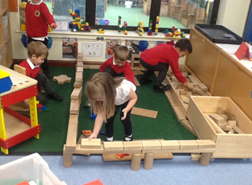
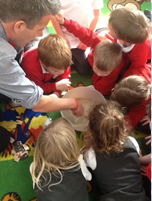
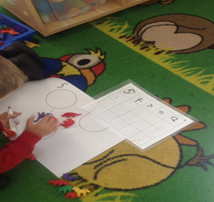
Another prime area of development is “Communication and Language” , the children are encouraged to develop good listening skills, to expand their vocabulary and to use talk to communicate effectively with both other children and adults within the learning environment. The final prime area of development is “Physical Development” and each child is encouraged to develop the skills needed to move confidently, safely and to use simple tools including scissors and writing materials. The children are also encouraged to develop their independent self-care skills and to know how to make healthy choices.
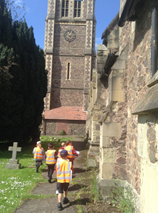
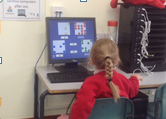
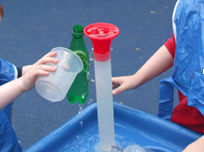
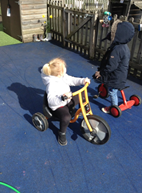
To develop their “Understanding the World”, the children have opportunities to experiment and explore resources such as, magnets and mirrors, to grow plants and to look closely and compare items such as shells and tiny creatures. The children are also encouraged to consider their own environment and other places, to develop their understanding of time and recall special events and to learn about special events for others. Children in Reception also become familiar with age appropriate ICT resources including the operation of devices such as cameras, CD players, torches, microphones, computers, mini-robots and the interactive whiteboard.
Specific areas of development include English and Maths. During their time in the Reception the children will encounter a wide range of stories both traditional and new, sometimes read aloud supported by pictures, sometimes told using puppets and toys, sometimes acted out with masks or props and sometimes supported by videos and animations. The children are encouraged to enjoy remembering and retelling stories and to create their own stories. The children typically spend a few minutes each day developing their listening skills and learning to hear the sounds within words. They are encouraged to recognise familiar written words such as, their names and signs around the room and they have lots of opportunities to explore mark-making themselves using a variety of materials including pens, pencils, sand, foam and paint. This is the style of letter formation that school staff will model for the children:-

Phonics- Essential Letters and Sounds
In school, we use Essential Letters and Sounds to learn the main sounds used in reading and writing (phonics). We will usually learn four or five sounds each week. Each sound has a rhyme with it that will be sent home with your child so that you can have a go at home too. The sounds are not taught in alphabetical order but in a way that allows the children to make many words using just the first six sounds, e.g. sat, pat, pin. We ask that you help your child with the learning of these letters by practising the formation in the book they will be given as well as reading their ‘I can read’ book every day.
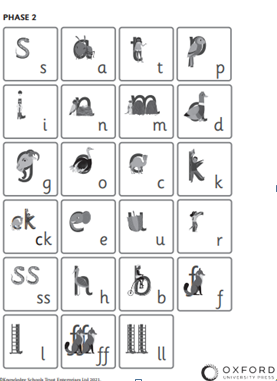
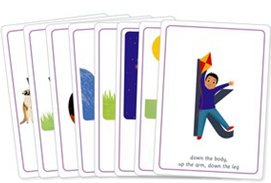

Alongside our new phonics sounds, each week we will learn harder to read and spell words. e.g. ‘he’ and ‘the’. These are words that need to be learnt because they can not be blended using phonics. These words will come home with your child when we learn them at school and we again ask you to help your child by practising these words in terms of both reading and writing.
Mathematics
The children in the Early Years are given encouragement to sort and group objects, to join in with counting songs, to record quantities by making marks (for example, tally marks on a scoreboard) and to use real objects to solve simple number problems such as, “How many will there be if we add one more/take one away?” all of which support the children in their development of mathematical understanding. The children are also encouraged to explore shapes, sizes and patterns through picture making and model building and to compare weight and capacity during their play with sand, water and other materials. IN the Reception Class we follow 'White Rose' Maths to ensure depth in learning.
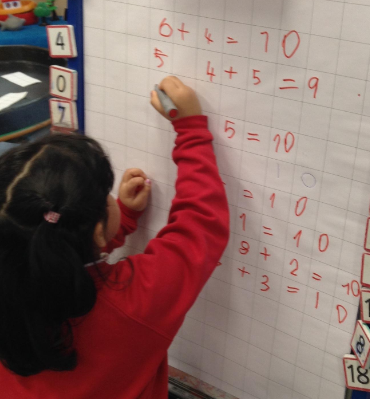
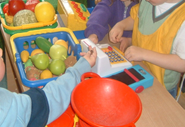
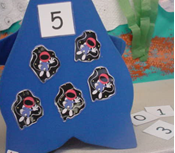
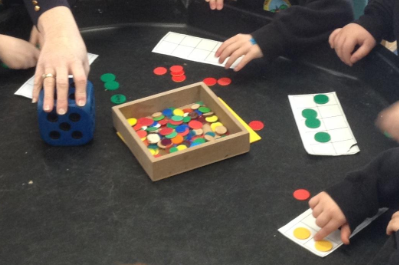
Outdoor Learning
All the children are encouraged to have some time being active playing outdoors every day. Learning outside is important for all areas of our curriculum and a wide variety of activities take place outside, for example, hunting for letters, counting real things, pretend play, looking carefully at nature, messy play and group problem-solving activities as well as physical activities such as throwing and catching, balancing or riding tricycles. We aim to spend some time outside during every session (unless the weather conditions are actually dangerous) so appropriate clothing and footwear are very important. A wide variety of open-ended resources are provided to support the children in developing creative and problem-solving skills.
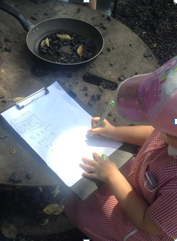
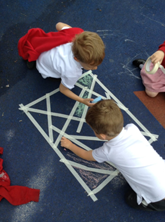
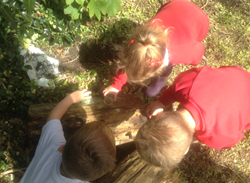
Learning at home
Each child will have a Home to School reading record. This will be used to communicate messages to you and also allow you to provide us with information or ask any questions. We do want to emphasise that you can come and talk to us at any time before or after school but the reading record can be used for less important things. The reading record will also provide the chance to communicate with any parents we do not see every day. Please help your child every day with their reading. Allowing your child to read their story book on a daily basis will help them progress throughout the year. Reading a bedtime story is also very helpful as this improves their storytelling and vocabulary.
